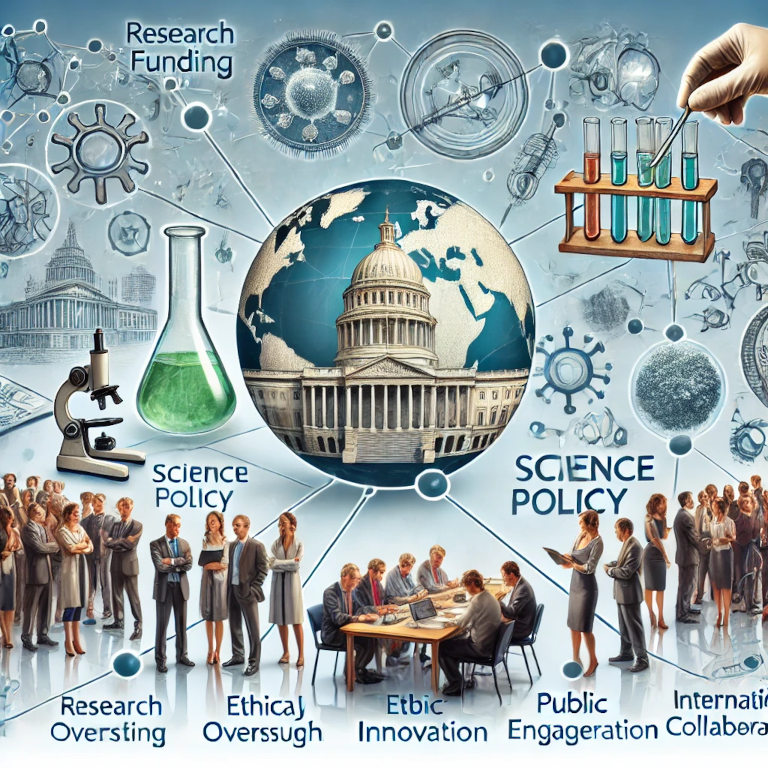Science policy plays a pivotal role in shaping the relationship between scientific research and societal needs. It encompasses the guidelines, regulations, and initiatives that govern scientific research and its application. As an expert in Science and Education, I will elucidate the intricacies of science policy, its significance, and its impact on scientific progress and societal advancement.
What is Science Policy?
Science policy refers to the framework through which governments, institutions, and organizations manage and support scientific research and innovation. It involves the allocation of resources, the establishment of research priorities, and the creation of regulations that govern scientific activities. Science policy aims to ensure that scientific endeavors are aligned with public interests and contribute to societal well-being.
The Importance of Science Policy
- Funding and Resource Allocation: Science policy determines how funds and resources are distributed among various scientific disciplines and research projects. This allocation is crucial for advancing scientific knowledge, fostering innovation, and addressing critical societal challenges.
- Setting Research Priorities: Science policy helps establish research priorities that reflect national and global needs. By focusing on areas such as health, environment, energy, and technology, science policy ensures that research efforts are directed towards solving pressing issues.
- Ethical and Regulatory Oversight: Science policy provides a framework for ethical and regulatory oversight of scientific research. This includes guidelines for conducting research responsibly, ensuring the welfare of research subjects, and maintaining integrity in scientific practices.
- Promoting Innovation and Competitiveness: Effective science policy fosters innovation and enhances a nation’s competitiveness in the global scientific landscape. It supports the development of new technologies, encourages collaboration between academia and industry, and promotes the commercialization of research outcomes.
- Science Communication and Public Engagement: Science policy plays a role in promoting science communication and public engagement. By facilitating dialogue between scientists and the public, science policy helps build trust in scientific research and ensures that scientific knowledge is accessible to all.
Key Components of Science Policy
- Research Funding: One of the primary components of science policy is the allocation of funding for research. Governments and funding agencies provide grants and financial support to research institutions, universities, and individual researchers. This funding is essential for conducting experiments, acquiring equipment, and supporting research personnel.
- Regulatory Frameworks: Science policy establishes regulatory frameworks that govern scientific activities. This includes regulations on clinical trials, environmental impact assessments, and the use of genetically modified organisms (GMOs). Regulatory frameworks ensure that scientific research is conducted safely and ethically.
- Education and Workforce Development: Science policy also focuses on education and workforce development to cultivate the next generation of scientists and researchers. This includes funding for STEM (Science, Technology, Engineering, and Mathematics) education programs, scholarships, and initiatives to promote diversity in science.
- International Collaboration: Science policy encourages international collaboration and cooperation. Scientific research often requires global efforts, and science policy facilitates partnerships between countries, sharing of resources, and joint research initiatives.
- Public Policy Integration: Science policy integrates scientific knowledge into broader public policy decisions. This ensures that policies related to health, environment, and technology are informed by the latest scientific research and evidence.
Challenges in Science Policy
- Balancing Competing Interests: Science policy must balance competing interests and priorities. This includes balancing short-term needs with long-term goals, addressing the interests of various stakeholders, and ensuring equitable distribution of resources.
- Ensuring Ethical Conduct: Maintaining ethical standards in scientific research is a significant challenge. Science policy must ensure that research is conducted with integrity, transparency, and accountability.
- Adapting to Rapid Technological Changes: The rapid pace of technological advancements presents a challenge for science policy. Policymakers must stay abreast of new developments and adapt policies to address emerging technologies and their potential impacts.
- Promoting Public Understanding of Science: Enhancing public understanding and appreciation of science is crucial. Science policy must address misinformation and promote science literacy to ensure that the public can make informed decisions.
The Role of Scientists in Science Policy
Scientists play a critical role in shaping science policy. Their expertise and insights are invaluable for informing policy decisions and ensuring that policies are grounded in scientific evidence. Scientists can contribute to science policy by:
- Engaging with Policymakers: Scientists can engage with policymakers by providing expert testimony, participating in advisory panels, and contributing to policy development.
- Communicating Research Findings: Effective communication of research findings to policymakers and the public is essential. Scientists can use various platforms to share their knowledge and advocate for evidence-based policies.
- Collaborating with Stakeholders: Collaboration with stakeholders, including industry, non-governmental organizations (NGOs), and the public, is important for developing comprehensive and inclusive science policies.
- Advocating for Science: Scientists can advocate for increased funding for research, better regulatory frameworks, and policies that support innovation and scientific progress.
Summary
Science policy is a critical component of the scientific enterprise, shaping the way research is conducted, funded, and applied. By setting research priorities, providing ethical oversight, and promoting public engagement, science policy ensures that scientific endeavors contribute to societal advancement. Effective science policy requires the collaboration of scientists, policymakers, and stakeholders to address the complex challenges of our time and drive progress in science and technology.






